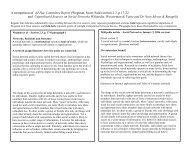Strange Scholarship in the Wegman Report - Get a Free Blog
Strange Scholarship in the Wegman Report - Get a Free Blog
Strange Scholarship in the Wegman Report - Get a Free Blog
Create successful ePaper yourself
Turn your PDF publications into a flip-book with our unique Google optimized e-Paper software.
<strong>Strange</strong> <strong>Scholarship</strong> <strong>in</strong> <strong>the</strong> <strong>Wegman</strong> <strong>Report</strong> V1.0 09/26/10<br />
[BAR2006a, p.38]:<br />
―MR. STUPAK. Okay. Let me ask you this question. Have you reviewed<br />
any of Mr. Mann's later ref<strong>in</strong>ements of his 1999 report?<br />
DR. WEGMAN. I have reviewed some level of detail, not <strong>in</strong> <strong>in</strong>tense level<br />
of detail, <strong>the</strong> cont<strong>in</strong>u<strong>in</strong>g papers, <strong>the</strong> cont<strong>in</strong>u<strong>in</strong>g papers, most of which<br />
are referenced--<strong>in</strong> fact, <strong>the</strong> ones that are referenced--<br />
MR. STUPAK. Did he ref<strong>in</strong>e his data and his methodology?<br />
DR. WEGMAN. My take on <strong>the</strong> situation is that ra<strong>the</strong>r than accept <strong>the</strong><br />
criticism that was leveled, he rallied <strong>the</strong> wagons around and tried to<br />
defend this <strong>in</strong>correct methodology.‖<br />
[BAR2006a, p.41]:<br />
―MS. SCHAKOWSKY. Well, let me ask you this. Dr. Mann has published<br />
dozens of study s<strong>in</strong>ce <strong>the</strong> orig<strong>in</strong>al hockey stick study and as I said earlier,<br />
beg<strong>in</strong>n<strong>in</strong>g <strong>in</strong> 2003 he reformulated <strong>the</strong> statistical methods. Do you take <strong>in</strong>to<br />
account <strong>the</strong>se later studies <strong>in</strong> your report?<br />
DR. WEGMAN. I have read his later studies. I was not asked about his<br />
later studies.‖<br />
None of this is consistent, but avoids answer<strong>in</strong>g an <strong>in</strong>convenient question,<br />
Meme-h❶. If <strong>Wegman</strong> had not been asked about later studies, why are<br />
<strong>the</strong>y referenced, Summarized and discussed <strong>in</strong> <strong>the</strong> Literature Review? The<br />
WP was not asked to become expert <strong>in</strong> Bristlecone p<strong>in</strong>es, nitrogen<br />
fertilization or SNA, but <strong>Wegman</strong> op<strong>in</strong>ed on <strong>the</strong>m, too.<br />
Even ignor<strong>in</strong>g <strong>the</strong> plagiarism, <strong>the</strong> poor quality of work is clear <strong>in</strong> W.11.8.<br />
Mann, et al (2005) was <strong>the</strong> latest-available Mann-led paper, mak<strong>in</strong>g it<br />
important. One need only scan that quickly to know <strong>Wegman</strong> is wrong.<br />
One can read <strong>the</strong> WR Summary of that paper, see that Mann, et al had<br />
moved from PCA to RegEM and had evaluated various methods. The<br />
same is <strong>in</strong> <strong>the</strong> Literature Review, p.24. He was clearly wrong about a<br />
simple fact of an Important Paper, how much time did he spend elsewhere?<br />
Who actually wrote or edited <strong>the</strong> 17 Summaries? I cannot know for sure,<br />
but Said certa<strong>in</strong>ly seems <strong>the</strong> likely choice, although help from Reeves,<br />
Rigsby or even MM+TT cannot be ruled out. In any case, <strong>the</strong> task of<br />
actually understand<strong>in</strong>g <strong>the</strong> relevant literature seems to have been left to<br />
junior person (s) with no relevant experience, but obvious <strong>in</strong>competence.<br />
The key PR messages of <strong>the</strong> WR mostly ignore its own Summaries,<br />
Bibliography and Literature Review. They just look like scholarship.<br />
26<br />
Once aga<strong>in</strong>, <strong>the</strong> two key missions #1 and #2 were:<br />
WR, p.7:<br />
―To this end, Committee staff asked for advice as to <strong>the</strong> validity of <strong>the</strong><br />
compla<strong>in</strong>ts of McIntyre and McKitrick [MM] and related implications. …<br />
We have sought to reproduce <strong>the</strong> results of MM <strong>in</strong> order to determ<strong>in</strong>e<br />
whe<strong>the</strong>r <strong>the</strong>ir criticisms are valid and have merit. We will also comment on<br />
whe<strong>the</strong>r issues raised by those criticisms discussed <strong>in</strong> McIntyre and McKitrick<br />
(2005a, 2005b) raise broader questions concern<strong>in</strong>g <strong>the</strong> assessment of Mann<br />
et al. (1998, 1999) <strong>in</strong> peer review and <strong>the</strong> IPCC and whe<strong>the</strong>r such science<br />
assessments <strong>in</strong>volv<strong>in</strong>g work of a statistical nature require some type of<br />
streng<strong>the</strong>n<strong>in</strong>g to provide reliable guidance for policy makers.‖<br />
Is it plausible that <strong>the</strong> Committee staff ―asked for advice‖ or did <strong>the</strong>y<br />
really want someone to ratify and amplify <strong>the</strong> MM+TT ideas implied<br />
above? Did <strong>the</strong>y want someone to f<strong>in</strong>d MBH and paleoclimate both guilty?<br />
Was <strong>the</strong> attack on peer review expected from <strong>the</strong> start, Meme-b❶?<br />
People urged <strong>Wegman</strong> not to <strong>in</strong>clude that, A.11.2, slide 19.<br />
Suppose <strong>the</strong>y actually wanted expert, unbiased answers. An NRC panel<br />
was <strong>the</strong> right way. It might have been barely plausible to formally ask <strong>the</strong><br />
ASA for statisticians to evaluate <strong>the</strong> MBH statistics, #1, assum<strong>in</strong>g<br />
availability of some with at least m<strong>in</strong>imal climate knowledge. But<br />
<strong>Wegman</strong> obviously did not seem to understand (or accept) <strong>the</strong> Greenhouse<br />
Effect and Said showed no obvious expertise. At least <strong>Wegman</strong> or Scott<br />
likely might have done <strong>the</strong> right math, but Scott was barely <strong>in</strong>volved.<br />
But consider claimed mission #2, to evaluate paleoclimate peer review and<br />
<strong>the</strong> IPCC. That requires a serious multidiscipl<strong>in</strong>ary group of senior people,<br />
like <strong>the</strong> NRC panel, but plausibly add<strong>in</strong>g social scientists who actually<br />
study such issues. At <strong>the</strong> least, one would want a dist<strong>in</strong>guished panel, as<br />
done <strong>in</strong> ―Climategate‖ <strong>in</strong>vestigations run by Ron Oxburgh or Muir Russell.<br />
Would one pick a statistician, senior, but quite unfamiliar with <strong>the</strong> entire<br />
field, with help from a new PhD and some students? I doubt it.<br />
Is it plausible that Barton and Whitfield would have gone forward with<br />
this effort unless <strong>the</strong>y were absolutely sure <strong>the</strong> WR would produce <strong>the</strong><br />
“right” answers? They certa<strong>in</strong>ly were happy with <strong>the</strong> f<strong>in</strong>al report.<br />
But beh<strong>in</strong>d <strong>the</strong> façade is much more.



